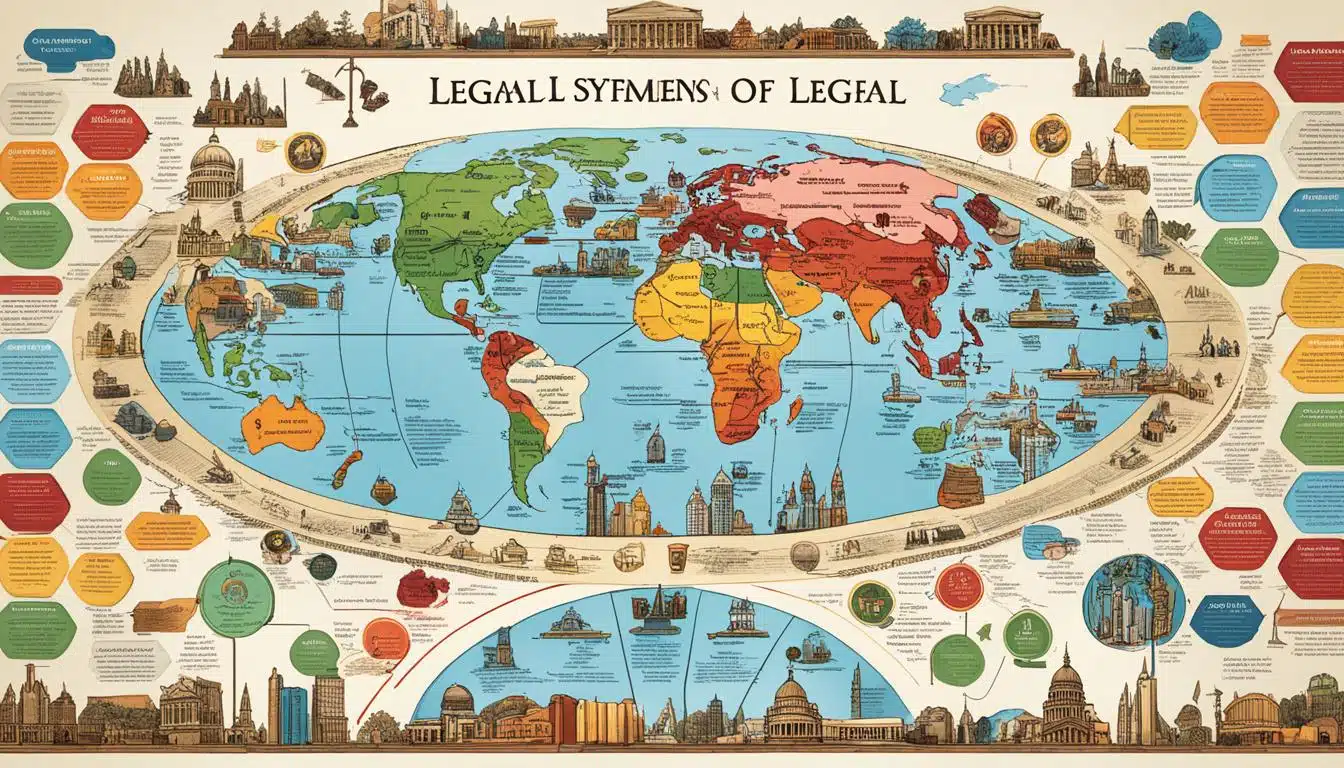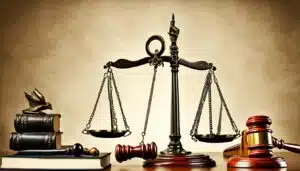The world has five main legal system types: civil law, common law, customary law, religious law, and mixed legal systems. Mixed or hybrid systems are becoming more common. This is because countries often take parts of several legal traditions to form their laws.
Legal systems differ by country but often have similar traits. The US legal system and those from British rule are known as common law systems. In these systems, courts use past decisions to understand laws. However, civil law systems from Europe and South America depend more on written laws than past cases.
Religious law systems, like Islamic law in Saudi Arabia, interpret laws from religious texts. Customary law systems are based on traditions within specific communities. These traditions are often not written down and are known only to that community. Lastly, mixed legal systems take features from multiple legal traditions. This shows that the world’s legal landscape is diverse.
Also Read : Top Patent Law Attorney For Your Innovation
Key Takeaways
- The five main types of legal systems are civil law, common law, customary law, religious law, and mixed legal systems.
- Common law systems, such as the US legal system, rely on judicial precedent, while civil law systems use comprehensive legal codes.
- Religious law systems, like Islamic law, base their rulings on religious texts, while customary law systems are rooted in community traditions.
- Mixed legal systems combine elements from two or more of the main legal traditions, reflecting the legal pluralism in many countries.
- Understanding the diversity of legal systems is crucial for navigating the global legal landscape and interpreting the laws of different nations.
Also Read : Advantages Of A Commercial Vehicle Accident Lawyer
Introduction to Legal Systems
A legal system guides a society with its set of laws, rules, and court procedures. It offers the foundation for how a group of people live, resolve conflicts, understand rights, and enforce laws.
Definition of Legal Systems
The definition of legal systems involves different frameworks that control how people, groups, and governments act within a specific area. These systems are meant to support fairness, lawfulness, and social harmony.
Also Read : Comprehensive IP Protection With Justice Law
Importance of Legal Systems
Legal systems are crucial for a society to function well. They set rules for behavior, protect people’s rights, and help solve disagreements. Additionally, they are key for economic growth, making business easier and attracting investment.
Historical Evolution of Legal Systems
Over time, legal systems have changed due to cultural, political, and economic influences. Mesopotamia and Egypt started this trend, leading to the vast variety of legal frameworks we see today.
Common Law Systems
Common law systems began in England. They use precedent as a key idea. This means decisions by judges are binding and help form the law through case law. The US legal system and others under British rule follow these ideas too.
Also Read : The Importance Of Contract Law In Business
Origins and Development
The start of the common law goes back to the English legal system. It all began after the Norman Conquest in 1066. As time passed, the courts in England built up a collection of case law. This system moved to countries like the United States, Canada, Australia, and India.
Key Principles of Common Law
Common law systems have a few key aspects. One is the doctrine of stare decisis. It means courts should stick to earlier decisions. There’s also the adversarial system. In this setup, both sides argue their cases in front of a judge or jury.
These principles help keep the law the same for everyone. They make sure the law is handled in a fair and equal way.
Examples of Common Law Systems
Places like the United States, the United Kingdom, Canada, Australia, and India follow common law. Many former British colonies do too. These legal systems depend a lot on past cases and how they were decided.
Also Read : What Are Your Rights In Criminal Law: Simple Explanation
Civil Law Systems
Civil law systems, known worldwide, are used in about 150 countries. Their origins come from the Roman Corpus Juris Civilus. This was a set of laws created by the Byzantine Emperor Justinian I between A.D. 528 and 565.
The laws created by Justinian I formed the basis of civil law systems. They focus on legal codes instead of past court cases. Civil codes are key. They deal with many legal topics, like property and contracts.
The Napoleonic Code had a big impact. It was made law in France in 1804. The Napoleonic Code valued personal freedom, fairness, and the rule of law. This code influenced many other countries in Europe and Latin America.
Today, civil law systems are used in most of Europe, South America, and some of Asia and Africa. Although each country has its own legal codes, the main ideas are the same. Civil law focuses on clear laws and making sure justice is predictable.
| Key Characteristics of Civil Law Systems | Examples of Countries with Civil Law Systems |
|---|---|
|
|
Types Of Legal Systems
Around the world, we find five main legal systems. These are common law, civil law, religious law, customary law, and mixed legal systems. Each one has its unique features. They shape how the law works in countries that use them.
Common Law Systems
In countries like the United States, the legal system is based on common law. Under this system, previous court cases set the rules. Courts use these past decisions to make new ones. This creates a system where the law evolves over time.
Civil Law Systems
Places like Europe and Latin America follow civil law systems. Here, the laws are written in codes. Judges don’t make law, they only interpret it. This system has been influenced by the Napoleonic Code and Roman law.
Religious Law Systems
Religious law systems rely on religious texts. Islamic Sharia law and Hindu law are examples. Courts in these systems look to religious teachings for legal guidance.
Customary Law Systems
Customary law comes from long-held traditions in a community or group. These traditions are not written down. But, they are still considered by the courts. This makes them part of the legal system.
Mixed Legal Systems
Many countries mix elements from different legal traditions. These are called mixed legal systems. They can have aspects of common, civil, religious, and customary law. This shows how diverse legal systems can be.
Knowing about different legal systems is important. It helps in understanding the laws of different countries. It also shows how varied and complex the world of law is.
Religious Law Systems
Religious law systems use religious texts for legal rules. Courts use these texts to decide today’s issues. These laws connect with the beliefs and traditions of many faith groups worldwide.
Islamic Law (Sharia)
One key religious law is Islamic law (Sharia). It follows the Quran and Sunnah, the Prophet Muhammad’s teachings. In places like Saudi Arabia and Iran, it guides daily life’s many aspects.
Canon Law
Within Christianity, canon law sets the rules. It’s the legal system of the Catholic Church. This system has influenced laws in Europe significantly.
Hindu Law
Hindu law guides legal issues in the Indian subcontinent. It comes from ancient texts like the Vedas. Hindu law covers personal, social, and religious issues for Hindus.
| Religious Law System | Primary Source of Law | Countries/Regions |
|---|---|---|
| Islamic Law (Sharia) | Quran and Sunnah | Saudi Arabia, Iran, and other Muslim-majority countries |
| Canon Law | Catholic Church teachings and regulations | European countries with a strong Catholic tradition |
| Hindu Law | Vedas and Dharmasastras | India and other parts of the Indian subcontinent |
These religious systems strongly affect community laws and culture. They show how religion influences law and life decisions.
Customary Law Systems
Customary law systems are built on the traditions and practices of a specific community. These unwritten laws are deeply woven into the social fabric. They’re seen as enforceable rules, separate from formal legal systems.
Definition and Characteristics
Customary law roots in the rules and principles of a community’s customs, practices, and beliefs. It is community-based, passed down orally, and changes to fit new situations. This law is close to the cultural identity, values, and ways of resolving conflicts for the people living by it.
Examples of Customary Law Systems
Customary law can be found worldwide, especially in indigenous or tribal settings. For example, there’s Aboriginal customary law in Australia, Native American tribal law in the U.S., and Adat law in Indonesia. Sharia-based customary law is also present in Muslim-majority countries. These systems often work alongside a country’s official legal structures.
| Characteristic | Description |
|---|---|
| Oral Transmission | Customary laws are typically passed down orally within a community, rather than being written down in formal statutes. |
| Community-Based | Customary law systems are deeply rooted in the traditions, values, and dispute resolution mechanisms of a specific community or indigenous group. |
| Flexible Adaptation | Customary law evolves over time to adapt to changing social, economic, and environmental conditions within the community. |
| Informal Enforcement | Customary law is often enforced through informal social sanctions, such as ostracization or loss of community standing, rather than formal legal mechanisms. |
Mixed Legal Systems
Mixed legal systems are known as legal pluralism. They have elements from civil law, common law, customary law, and religious law. These systems mix different legal traditions and methods. They show the influences of culture, history, and politics in a place.
Combination of Legal Traditions
Unique history and politics lead to the creation of mixed legal systems. Countries once ruled by Europe, like South Africa, Scotland, and Quebec, mix civil and common laws. Some Middle Eastern and North African nations combine Islamic law with civil or common law.
When customary or religious laws work with regular laws, a mixed system forms. In parts of Africa and Asia, local customs and tribal laws run with the official legal system.
Examples of Mixed Legal Systems
In the United States, the federal government follows common law. Each state, however, can use civil, customary, or religious laws. Louisiana, for example, has its own civil code.
Scotland’s system mixes civil and common laws. After 1707, it included English common law. This came from Roman law and England’s practices.
Quebec, Canada, blends French civil law with the country’s common law. It shows the province’s unique culture and language.
International Legal Systems
International law is a system of rules and treaties between countries. It influences how they interact. Unlike local laws, this public international law focuses on nations, not people or groups.
Sources of International Law
International law comes from many places. It includes treaties, customs, and general laws most nations follow. Decisions by international courts also help shape it. All these things create the basis for how nations and people relate worldwide.
International Courts and Tribunals
There are special courts and tribunals for international legal matters. These include the International Court of Justice and the International Criminal Court. They help settle disputes between nations or global organizations. They are key in making sure international laws are followed.
The decisions of these courts are very important. They help develop international law. They guide governments, organizations, and people acting on a global scale.
Comparative Analysis of Legal Systems
When we look at legal systems worldwide, we see big differences in how they work. They are based on different principles and methods. Some main differences are:
Differences in Legal Principles
The foundation and structure of a country’s legal system play a huge role in its operation. For example, common law systems focus on past decisions and judges’ interpretations. On the other hand, civil law uses written laws and codes more. Religious law is based on sacred texts, and customary law relies on local traditions.
Challenges in Harmonization
Because of their many differences, making legal systems work together smoothly is tough. This affects how laws are followed in areas like global trade, human rights, and protecting the environment. Barriers come from different legal principles, cultural beliefs, and political ideas. This makes it hard to join legal systems in certain global areas.
Influence of Legal Systems on Societies
The laws in a country can deeply affect how its society grows and works. They impact the economy and help protect people’s rights. It’s key for leaders, companies, and regular people to know this.
Impact on Economic Development
Research shows the big effect of legal systems on the economy. When laws are clear and protect things like property and contracts, it’s good for business. This attracts outside money and helps the economy grow. But if laws are unclear or favor some unfairly, things slow down.
Role in Protecting Human Rights
Legal systems are also very important in keeping human rights safe. Good laws allow things like free speech and make sure everyone is treated the same. This stops the government from doing too much and helps keep the peace.
Still, some places misuse laws to treat certain groups badly. This happens more where democracy is weak. So, it’s vital to keep checking and improving laws to make sure they’re fair for everyone.
So, legal systems really shape a society in many ways. By understanding the links between laws, money, and rights, we can aim for better legal systems. These can help everyone live well, protect their freedoms, and make our societies fair and open.
Also Read : Comprehensive IP Protection With Justice Law
Conclusion
The world’s legal systems fall into five main types. These include common law, civil law, religious law, customary law, and mixed legal systems. Each type brings unique features and influences the society, economy, and politics of its country.
Knowing about the diversity of legal systems is key. It helps us understand the complex global legal scene better. This is useful for people, companies, and groups treading through international laws.
By exploring the different legal systems, we learn about diverse societies and cultures. We see how they deal with justice, governance, and the rule of law. Such insights can improve our perspectives and spark innovative solutions in our connected world.
Moving ahead, recognizing the importance of legal diversity is critical. It impacts our world significantly. By embracing this, we can use the law to build a fairer, more equal, and prosperous tomorrow for everyone.
FAQs
What are the main types of legal systems around the world?
Civil law, common law, customary law, religious law, and mixed legal systems are the main types. Each has unique features and principles.
What is the definition of a legal system?
It is a set of laws, rules, and processes that govern a society. These define how society works, including resolving conflicts and defining people’s rights.
Why are legal systems important?
They are key for a country’s growth and political life. Legal systems show how society operates and resolve conflicts.
What are the key differences between common law and civil law systems?
Common law, seen in the US, relies on past court decisions. Civil law, found in Europe, focuses on legal codes instead.
What are the characteristics of religious law systems?
Systems like Islamic law in Saudi Arabia use religious texts for their laws. Courts base decisions on these texts.
How do customary law systems differ from other legal systems?
They’re based on long traditions in a community. These rules, often oral and for insiders, are seen as law by courts.
What is a mixed or hybrid legal system?
It blends features of different legal traditions, like civil or common law. Today, many countries use mixed systems.
How does international law differ from national legal systems?
International law is about rules between countries, not within them like national law. It focuses on states, not individuals.
What are some key differences between the world’s major legal systems?
Major legal systems differ in how they see laws and run courts, which impact society and politics. Their principles and sources of law vary.
How do legal systems influence the societies they govern?
A country’s legal system affects how its society grows and protects rights. Choosing a legal system is critical for a nation’s success.








